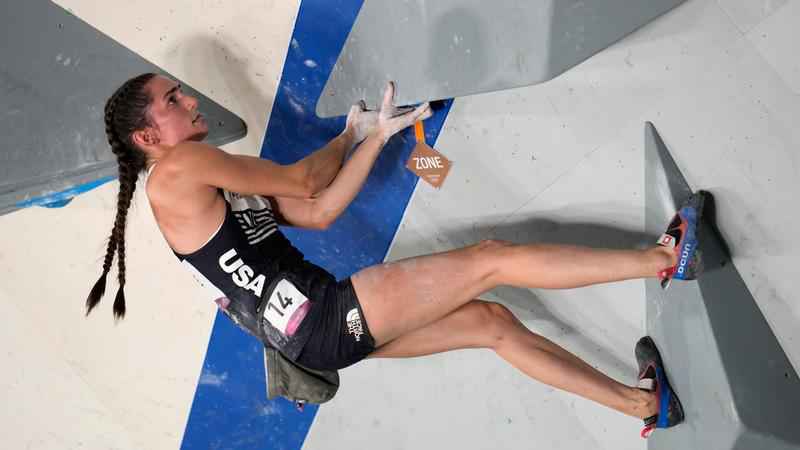Shorview native finishes 11th in Olympic sport climbing competition

Kyra Condie, of the United States, climbs during the bouldering qualification portion of the women's sport climbing competition at the 2020 Summer Olympics, Wednesday, Aug. 4, 2021, in Tokyo, Japan. [AP Photo/Jeff Roberson]
Kyra Condie’s effort placed her in the 11th slot for the Olympics sport climbing competition.
The 25-year-old Shoreview native finished 11th in the women’s combined event. That format combines three different climbing disciplines.
Sport climbing made its Olympic debut via the Tokyo Games and featured three disciplines: lead, bouldering and speed climbing.
Lead is pretty much what recreational climbers face at climbing gyms, only on a much higher wall (15 meters) and far more difficult. There’s a six-minute limit, whoever climbs highest wins.
Bouldering is a set of four "problems" on 4.5-meter walls where turning upside down is sometimes the solution to reaching the top. Climbers have five minutes — four in the final — to solve each boulder in as many attempts as they want.
Speed is a race to the top of a 15-meter wall on a standardized route.
As of Wednesday, Condie finished seventh in speed climbing, 11th in bouldering and 11th in lead climbing.
‘Having something to overcome really stoked my training’
From an early age, Condie was interested in climbing.
She was moved from a crib as a baby because she kept climbing out, and if her parents looked away for a second, they’d find her atop something — a cliff, the cover of the playground equipment, door frames, the refrigerator.
By 11, Condie started taking climbing more seriously and joined a team at Vertical Endeavors in St. Paul.
However, the more she climbed, the more her back hurt.
Condie took matters into her own hands, first with a Google search, then by asking someone at her gym to check for scoliosis. That led to a trip to the doctor and X-rays revealing an S-shaped curve in her spine, already arching well over 50 degrees — life-threatening if she didn’t get it fixed.
The first doctor told Condie climbing may no longer be in her future. A nurse added it wouldn’t be a big deal, that she would have a family some day and climbing wouldn’t be as important.
What they didn’t understand was the determination of the young girl in front of them.
"It didn’t sit well with me, even at that age," Condie said.
The family went to two more doctors, both of whom said she could be back climbing within four months. They went with the consensus and, not long before her 14th birthday, Condie underwent surgery to correct a 72-degree curve in her spine.
"It’s supposedly one of the more painful surgeries you can get and I was totally unprepared for how much pain I was going to be in in the hospital," Condie said.
The surgery corrected her scoliosis, but it presented a new set of problems on the climbing wall.
Because her spine was fused into place, Kyra was unable to arch her back and had trouble bending sideways — important skills for high-level climbers.
Undeterred, she found new ways to work up the wall, honing her technique and problem solving. Condie’s method isn’t always the easiest, but it works for her.
"It’s often really helpful to focus on what something can do for you, not what it can take away. She’s done that," said Meg Coyne, USA Climbing national team manager and assistant coach. "It’s absolutely amazing that she can do what other people can do, often better."
Condie willed herself into becoming one of the world’s best sport climbers.
She moved to Salt Lake City in 2019 so she could work with the coaches at USA Climbing and, at 23, became one of the first American women to qualify for the Tokyo Olympics.
“I was always kind of defiant and didn’t like being told I couldn’t do something,” she said. “Also, kind of the aspect of I was not naturally the best. I wasn’t used to winning but I really wanted to win. That coupled with having something to overcome really stoked my training.”
The Associated Press contributed to this report.